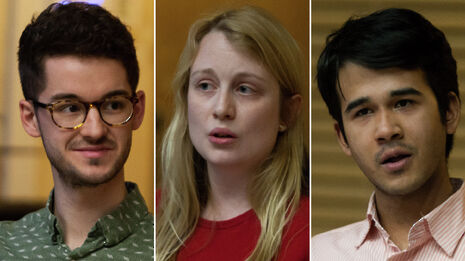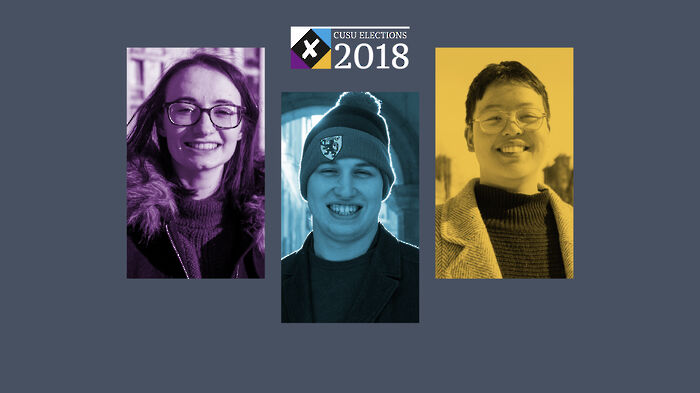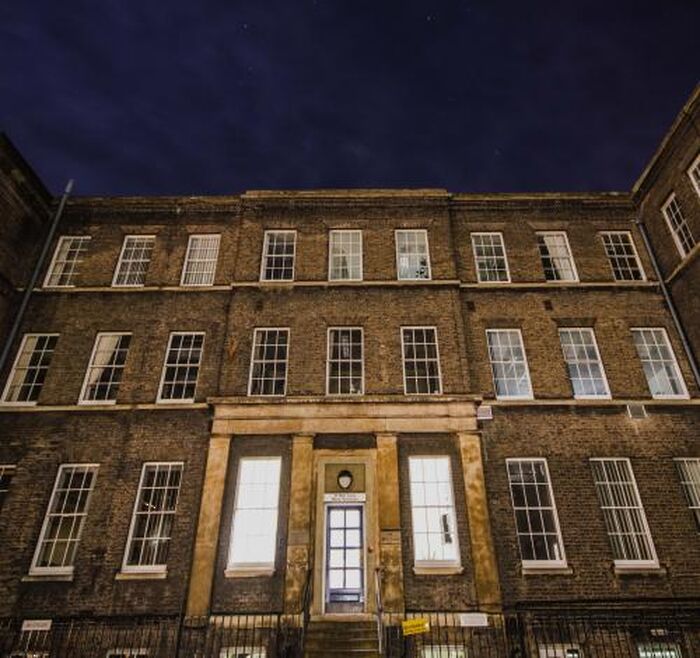
Candidates battle to take Graduate Union into the future
Joe Cotton, Sofia Ropek Hewson, and Mrittunjoy Guha Majumdar are competing to become the organisation’s next leader

With CUSU and Graduate Union (GU) elections in full swing, most of the attention has been reserved for the three candidates for CUSU president. The race for the GU presidency has proven equally competitive, however, with Joe Cotton, Sofia Ropek Hewson, and Mrittunjoy Guha Majumdar vying to take over from the incumbent, Darshana Joshi.
With only two candidates last year and one in 2016, this is the most competitive GU election since 2015. The winner will become the primary representative of graduate students at the University and the chair of the GU’s Board of Trustees.
The presidential role, which is a full-time, paid sabbatical position, will also involve sitting on the two highest decision-making bodies in the University; the University Council and General Board. They are supported by two other sabbatical officers: the CUSU/GU welfare officer, and the GU vice-president, a role introduced in Michaelmas term 2016 and currently occupied by Nikita Hari.
In hustings yesterday, the candidates debated how they would best fulfill these duties. The candidates had similar positions on many key issues, with notable agreement on the need for greater representation of the liberation campaigns in MCRs. The candidates also recognized the importance of greater cooperation between the GU and MCRs, and they all shared opposition to Prevent.
Cambridge is unusual in having two student unions, an issue which has caused controversy in the past after the University considered plans to merge it with CUSU. Despite its name, the GU represents more than just graduate students: mature students and fourth years are also allowed to vote and attend its meetings.
The GU’s actions focus on four areas: representation, services, welfare, and events. Its work in welfare is largely in collaboration with CUSU, with the two organisations managing the Students’ Unions’ Advice service together.
Cotton, who is taking a Sociology MPhil at Wolfson, is the current Chair of CUSU Council and a graduate HSPS faculty board representative. In hustings, he agreed with the other candidates on the need for greater BME representation in MCRs and said that the GU should be more active, engaged, and political. He pointed out that only 6% of graduates voted in last year’s election to underline the need for increased engagement.
Guha Majumdar, a PhD student in Physics at Christ’s who has been endorsed by CULC and CULA, opened the debate by highlighting his three years of experience as a CUSU or GU executive officer. He was CUSU Campaigns Officer in 2015-16, the GU International Officer in 2016-17, and is the GU Welfare Officer this year. He also stressed the need for greater connectivity between the GU and MCRs.
Ropek Hewson, a PhD student in contemporary French and Spanish, is the current president of Pembroke Graduate Parlour (PGP), the College’s MCR. Last year, she was the Women’s Officer of PGP. During the hustings, she centred her campaign on helping grad students find a community, whether in their colleges or their faculties.
Ropek Hewson said she would do this is by collaborating with MCRs to ensure that the Women’s Campaign and BME campaign are working for graduate students, highlighting that marginalised graduate students sometimes face different challenges than undergraduates.
Although the candidates agreed on the need for greater representation of the liberation campaigns, they disagreed on the nuance of how to achieve this. Ropek Hewson said that she wishes to see more BME and liberation officers in MCRs, and Cotton added welfare officers on MCR committees to be replaced by officers for liberation roles, citing BME, Women’s, and LGBT+ officers as examples. Guha Majumdar contributed to the discussion by emphasising the danger of tokenism and the importance of considering intersectionality.
The candidates also differ on a range of more specific issues: Ropek Hewson’s manifesto is the only one that brings up graduate couples and families, Cotton is the only one to bring up financial issues, and Guha Majumdar is the only one to raise environmental issues and general development projects like pushing for more streetlamps and cycle stands. Furthermore, Guha Majumdar and Cotton proposed broad reform to the supervision system in their manifestos while Ropek Hewson did not.
A push for greater engagement has been a major focus of the GU this year, with current president Darshana Joshi having said last year that her “first priority” as President would be to make the GU “more visible and relevant in the graduate studentscape.”
That was shortly after Joshi won an election in which only 578 of the 10,510 eligible students voted – and even that “well exceeded” that of the previous year according to 2015-16 GU president Chad Allen.
In a statement, current GU vice-president Nikita Hari said: “The Graduate Union has continued to grow, the structural and representational changes have ensured that it carries the confidence of both its members and the University.”
“We are also trying to develop the GU Council into a platform where grad centric issues and policies are discussed and debated with the higher university administration”, she said.
Seven MCRs are currently disaffiliated from the GU, and bringing them back into the fold could be a target for its next president. Hari said that some MCRs had already begun to re-engage.
“Improved communications with our members have ensured that even the MCRs disaffiliated from the GU have been regularly participating in our Council meetings as non-voting members,” she said. “We have been working on a lot of interesting projects that affect all dimensions of the postgraduate student experience at Cambridge, for eg. the graduate mental health, stronger support system for students with families, improved pastoral care, better implementation and communication of code of practise,graduate tutorial provisions, campaigning for better research experience for graduates and lobbying for rent/accommodation issues.”
Engagement is only one of the setbacks that plagued the GU in recent years. It was removed from the Charity Commission’s register of charities in February 2015 after failing to file its annual accounts, and had to fight off efforts by CUSU to produce a merger of the two organisations two years ago.
These crises led the University to consider dropping the GU altogether in a review launched at the end of 2015. The University Council eventually unanimously voted to continue to recognise the Graduate Union as representative of graduate students a month later, despite CUSU’s efforts.

All the election news, in one place
Comprehensive news and analysis on the CUSU/GU elections, collected.
Visit Varsity’s Elections 2018 hub.
 News / Colleges charge different rents for the same Castle Street accommodation2 March 2026
News / Colleges charge different rents for the same Castle Street accommodation2 March 2026 News / News in Brief: waterworks, wine woes, and workplace wins 1 March 2026
News / News in Brief: waterworks, wine woes, and workplace wins 1 March 2026 News / Climate activists protest for ‘ethical careers policy’1 March 2026
News / Climate activists protest for ‘ethical careers policy’1 March 2026 News / Angela Merkel among Cambridge honorary degree nominees27 February 2026
News / Angela Merkel among Cambridge honorary degree nominees27 February 2026 News / Private school teacher who lied about Cambridge degree barred from teaching27 February 2026
News / Private school teacher who lied about Cambridge degree barred from teaching27 February 2026










